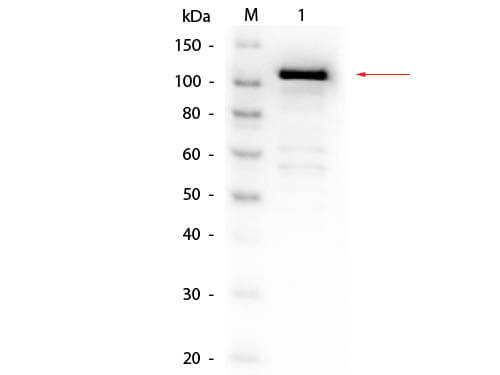Anti-BETA GALACTOSIDASE (E.coli) (RABBIT) Antibody Biotin Conjugated
Beta Galactosidase Antibody Biotin Conjugated
- SPECIFICATION
- CITATIONS
- PROTOCOLS
- BACKGROUND
| Host | Rabbit |
|---|---|
| Conjugate | Biotin |
| Clonality | Polyclonal |
Application
| WB, IHC, E, I, LCI |
| Application Note | Anti-Beta Galactosidase Biotin Conjugated Antibody has been tested by Western blot and is suitable for ELISA, immunohistochemistry, immunomicroscopy as well as other antibody based assays using streptavidin or avidin conjugates requiring lot-to-lot consistency. The antibody recognizes both frozen tissue sections, paraffin embedded tissue and 4% paraformaldehyde fixed tissue for most immunohistochemical analysis. A 1:5,000 dilution has been reported to be successful for staining by immunoblot of beta-galactosidase fusion proteins after transfer using a semi-dry transfer apparatus. A 1:1,500 dilution has been reported to detect beta-galactosidase in adult rat spinal cord tissue after infection with helper-dependent adenovirus expressing lacZ. In this particular experiment, tissue was perfused with 4% paraformaldehyde and cryostat-cut (35 µm) to produce free-floating sections. A 1:5,000 dilution has been reported to be successful for staining of brain sections from transgenic mice expressing nuclear beta-galactosidase when assayed by immunofluorescence microscopy. A 1:5,000 dilution has been reported for immunofluorescent staining of methanol fixed, devitellinized Drosophila embryos. Although a wide range of conditions was reported to be effective, a 1:10,000 dilution was noted to show no background and to be suitable for double labeling experiments. Optimal titers for other applications should be determined by the researcher. |
| Physical State | Lyophilized |
| Buffer | 0.02 M Potassium Phosphate, 0.15 M Sodium Chloride, pH 7.2 |
| Immunogen | Beta Galactosidase (E.coli) |
| Reconstitution Volume | 100 µL |
| Reconstitution Buffer | Restore with deionized water (or equivalent) |
| Stabilizer | 10 mg/mL Bovine Serum Albumin (BSA) - Immunoglobulin and Protease free |
| Preservative | 0.01% (w/v) Sodium Azide |
| Gene ID | 945006 |
|---|---|
| Purity | Anti-BETA GALACTOSIDASE Antibody, Biotin Conjugated, is an IgG fraction antibody purified from monospecific antiserum by a multi-step process which includes delipidation, salt fractionation and ion exchange chromatography followed by extensive dialysis against the buffer stated above. Assay by immunoelectrophoresis resulted in a single precipitin arc against anti-Biotin, anti-Rabbit Serum as well as purified and partially purified beta-Galactosidase [E.coli]. Cross reactivity against β-Galactosidase from other sources may occur but have not been specifically determined. |
| Storage Condition | Store vial at 4° C prior to restoration. For extended storage aliquot contents and freeze at -20° C or below. Avoid cycles of freezing and thawing. Centrifuge product if not completely clear after standing at room temperature. This product is stable for several weeks at 4° C as an undiluted liquid. Dilute only prior to immediate use. |
| Precautions Note | This product is for research use only and is not intended for therapeutic or diagnostic applications. |
| Name | lacZ |
|---|

Thousands of laboratories across the world have published research that depended on the performance of antibodies from Abcepta to advance their research. Check out links to articles that cite our products in major peer-reviewed journals, organized by research category.
info@abcepta.com, and receive a free "I Love Antibodies" mug.
Provided below are standard protocols that you may find useful for product applications.
Background
Anti Beta Galactosidase Antibody recognizes the enzyme beta galactosidase, or β-galactosidase, that is a component of assays used frequently in genetics, molecular biology (see X-gal) for a blue white screen, and other life sciences. IPTG induces production of β-galactosidase by binding and inhibiting the lac repressor. Since it is highly expressed and accumulated in lysosomes in senescent cells, it is used as a senescence biomarker both in vivo and in vitro in qualitative and quantitative assays, despite its limitations.
If you have used an Abcepta product and would like to share how it has performed, please click on the "Submit Review" button and provide the requested information. Our staff will examine and post your review and contact you if needed.
If you have any additional inquiries please email technical services at tech@abcepta.com.













 Foundational characteristics of cancer include proliferation, angiogenesis, migration, evasion of apoptosis, and cellular immortality. Find key markers for these cellular processes and antibodies to detect them.
Foundational characteristics of cancer include proliferation, angiogenesis, migration, evasion of apoptosis, and cellular immortality. Find key markers for these cellular processes and antibodies to detect them. The SUMOplot™ Analysis Program predicts and scores sumoylation sites in your protein. SUMOylation is a post-translational modification involved in various cellular processes, such as nuclear-cytosolic transport, transcriptional regulation, apoptosis, protein stability, response to stress, and progression through the cell cycle.
The SUMOplot™ Analysis Program predicts and scores sumoylation sites in your protein. SUMOylation is a post-translational modification involved in various cellular processes, such as nuclear-cytosolic transport, transcriptional regulation, apoptosis, protein stability, response to stress, and progression through the cell cycle. The Autophagy Receptor Motif Plotter predicts and scores autophagy receptor binding sites in your protein. Identifying proteins connected to this pathway is critical to understanding the role of autophagy in physiological as well as pathological processes such as development, differentiation, neurodegenerative diseases, stress, infection, and cancer.
The Autophagy Receptor Motif Plotter predicts and scores autophagy receptor binding sites in your protein. Identifying proteins connected to this pathway is critical to understanding the role of autophagy in physiological as well as pathological processes such as development, differentiation, neurodegenerative diseases, stress, infection, and cancer.


